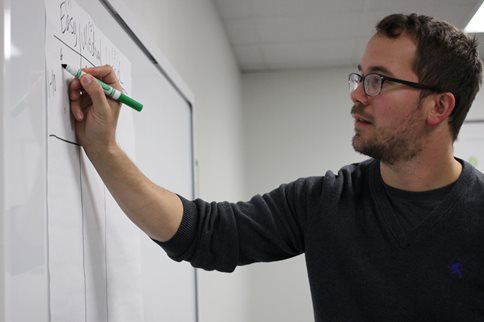'It Takes a Village to Raise a Teacher'
Angela Chambers |
May 21, 2020

Students think teacher Cory Loveless is a vampire. He sends them emails late at night while grading papers. He went to Houston and didn’t come back to North Dakota with a tan.
To further the joke, the West Fargo High School AP® Calculus teacher added that “Count Loveless is celebrating his 420th birthday” to an exam question about blowing up balloons at a certain rate.
Loveless, NMSI’s May Teacher of the Month, finds ways to creatively engage students. He plays guitar for students and at community gigs with his band “Guys and Dahls,” featuring singer Tarah Dahl, a West Fargo AP Biology teacher.
“No longer is he ‘just a math teacher,’” says Principal Jennifer Fremstad. “That human connection has encouraged a variety of students to continue math courses beyond just those needed for graduation.”
Whenever possible, Loveless relates calculus problems to students’ interests and lives. One student plays softball, so he asked students about the West Fargo softball team hitting the ball at a certain velocity. Another problem involved a student’s work at a restaurant.
“Teaching isn’t the world, it’s only part of the world, so connecting to students’ outside world will help you [educators] be successful,” Loveless says. “It lets them know I’m thinking about them and care about what they have going on.”
As a high-level math course, students often receive their first B or C in AP Calculus. Loveless wants his students to know they don’t have to be perfect.
“It’s not to say you’re not good at math, it says you’re still learning,” he says. “Failure doesn’t mean you won’t get where you want to go. You just need to practice more.”

Mentors Matter
Loveless sees himself “standing on the shoulders of giants” that help him succeed as a teacher. “It takes a village to raise a teacher as well as a student,” he says.
Early influences were his calculus teachers at Grand Forks Central High, including Cindy Nelson and Miles Rodacker. “I loved how he [Rodacker] taught math that solved problems I was curious about,” Loveless says.
When he first started teaching AP Calculus, the educator that previously taught the course, Yianna Dilioglou, was a “really fantastic calculus teacher” who helped Loveless prepare his notes and learn what to expect on the AP exam.
Loveless is close with his West Fargo math department colleagues, who regularly inspire his teaching. Through NMSI, Loveless has had several mentors, including John Quintrell.
“A few students wanted to take AP Calculus BC, but our school only had Calculus AB,” Loveless says. “My challenge was to simultaneously teach both classes at the same time. He [Quintrell] helped me navigate when to introduce BC topics and try to balance and juggle the coursework.”
Other helpful NMSI mentors, including Tony Record and Bryan Passwater, provided Loveless with useful, creative resources.
By attending NMSI teacher trainings, Loveless learned that there’s a science to teaching AP courses. “Working with colleagues from all over the country, I always learn something in a different way or think, ‘Wow. That’s awesome. I’m totally going to use that,’” he says. “NMSI training is a foundation to stand on.”
Along with having mentors, Principal Fremstad says Loveless influences colleagues in the math department in “really positive ways.” He uses data about students’ learning experiences and seeks input and feedback from colleagues to improve instruction.
“Modeling this for his team has created a team focused on improved instruction and personal reflection in teaching,” Fremstad says. “No longer is the focus on what students didn’t do. It is, ‘What more can each teacher do to help students in the classroom?’”
Remote Learning
Having an online community of AP Calculus teachers – including Record and Passwater – have made the transfer to remote learning easier for Loveless.
West Fargo is a one-to-one tablet campus, which Loveless sees as a “huge blessing.” He sends students a worksheet on OneNote and has them write with a stylist on the tablets; then, he can send back digital responses. While most of West Fargo's remote coursework is asynchronous (on demand), Loveless meets once a week for a live video chat so he can help answer student questions.
One challenge he’s faced is when students are trying to work full time while also doing remote learning. They are getting used to completing assignments in a different time schedule. “When they go off to college, this is a pilot run on how to manage time when they have a lot of flexible time, which is good for them,” Loveless says.
Other students have “dropped off the face of the planet,” and they’re not doing their work online. If he doesn’t hear from them, Loveless sends a note to both the student and a parent.
“They’re not necessarily bad students,” he says. “Some of my B or C students become an F student because they came at the eleventh hour and haven’t done anything. If I was a first-time teacher, I might have been upset and given them zero credit. I’m willing to be flexible, but if they’re extremely late, I have to dock points.”
Loveless adds, “A lot of times, I have no idea what these students are dealing with. Some are taking care of younger siblings or working because parents got laid off. I’m flexible but still hold them accountable.”
When he was young, Loveless liked the satisfaction of putting the last brick on a completed Lego project. “I may put Lego pieces on students, but I won’t see the full set. I like to think that I put another log on the stack and know I left the woodpile higher than it started.”
Know a NMSI-connected teacher who deserves recognition? Email marketing@nms.org to tell us how they’re making a difference in math, science, English and arts education.